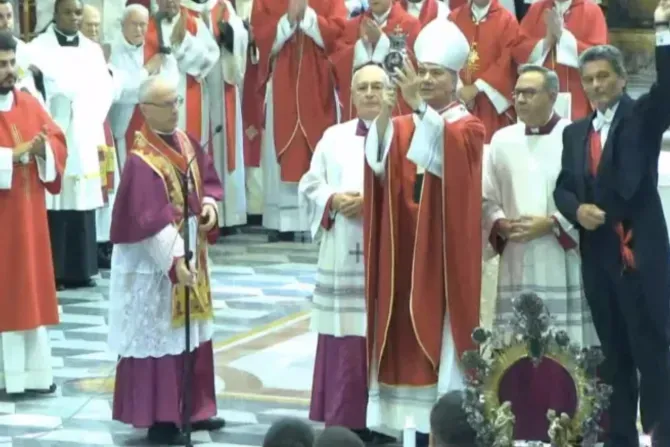It is believed the miracle has taken place since at least 1389, the first instance on record.
The liquefaction process sometimes takes hours or even days, and sometimes it does not happen at all. In local lore, the failure of the blood to liquefy signals war, famine, disease, or other disaster.
At Mass Sept. 19, Battaglia spoke about the miracle and what it is — and is not.
“Every year we see firsthand how the witness of a man who generously gave his life for the Gospel, until his last breath, until his last drop of blood, is not something of the past, a historic event useful only to write about in some pages of a book,” he said.
“No,” Battaglia continued, “it’s a testimony that is present, living, current, and capable of speaking to the heart of every believer, pushing him to more consistency, beyond courage, to a life of giving, steeped in sharing.”
He reminded those present that the blood of St. Januarius “is not an oracle to consult and even less a city horoscope whose function is to predict misfortune or fortune for the city. No, the relic we bless is simply a road sign, a finger that points us to the necessity, the urgency, the requirement to follow the Gospel in a radical way, being unreservedly attracted by its liberating beauty, listening with an open heart and mind to its word of life and hope.”
Battaglia said the blood of St. Januarius makes him think of the unjust bloodshed that happens every day “whenever a person is wounded, humiliated, not respected in his dignity.”
“I believe that the real miracle will take place the day this blood [of St. Januarius] is forever hard, compact, clotted!” the archbishop said. ”Yes, I believe that the real miracle will happen when justice kisses peace, when good overpowers evil forever, when the good news of Jesus Christ dries up the pain of the world, illuminates the darkness for good, brings all things to completion, enters so deeply into the hearts of men and women that their words, their deeds, their thoughts will be nothing but goodness, benevolence, beauty.”
After the Mass, the relic of St. Januarius’ blood will remain on display for veneration in the Cathedral of Naples until Sept. 26 in thanksgiving for the miracle.
Hannah Brockhaus is Catholic News Agency's senior Rome correspondent. She grew up in Omaha, Nebraska, and has a degree in English from Truman State University in Missouri.








